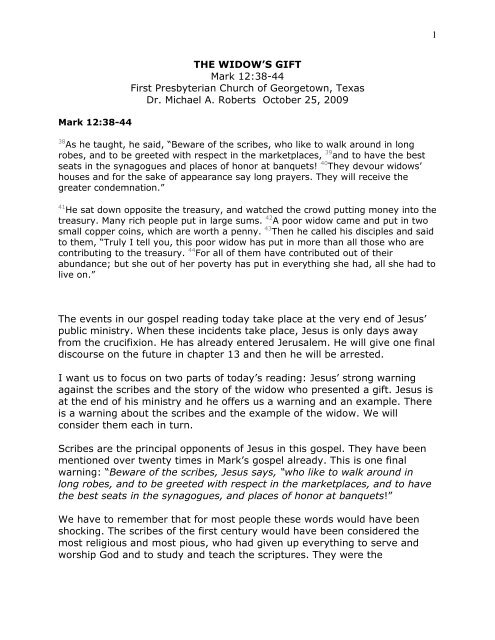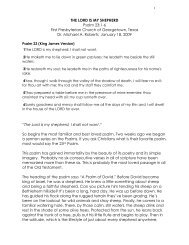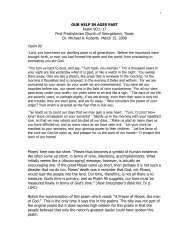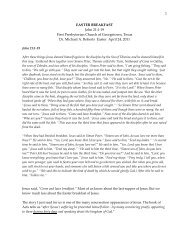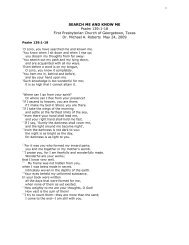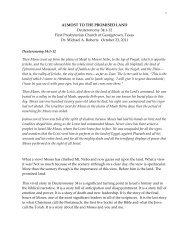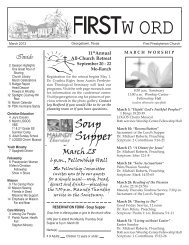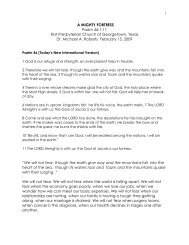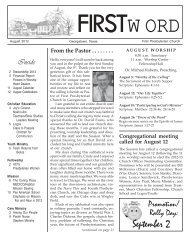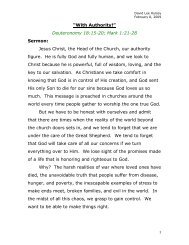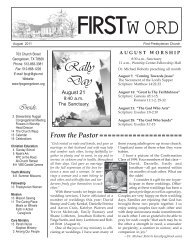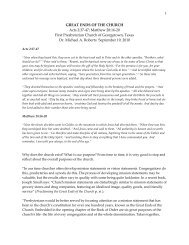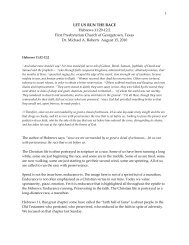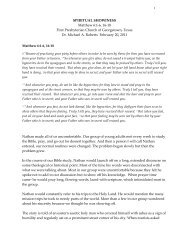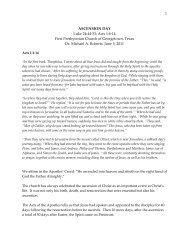1 THE WIDOW'S GIFT Mark 12:38-44 First Presbyterian Church of ...
1 THE WIDOW'S GIFT Mark 12:38-44 First Presbyterian Church of ...
1 THE WIDOW'S GIFT Mark 12:38-44 First Presbyterian Church of ...
Create successful ePaper yourself
Turn your PDF publications into a flip-book with our unique Google optimized e-Paper software.
1<strong>Mark</strong> <strong>12</strong>:<strong>38</strong>-<strong>44</strong><strong>THE</strong> WIDOW’S <strong>GIFT</strong><strong>Mark</strong> <strong>12</strong>:<strong>38</strong>-<strong>44</strong><strong>First</strong> <strong>Presbyterian</strong> <strong>Church</strong> <strong>of</strong> Georgetown, TexasDr. Michael A. Roberts October 25, 2009<strong>38</strong> As he taught, he said, “Beware <strong>of</strong> the scribes, who like to walk around in longrobes, and to be greeted with respect in the marketplaces, 39 and to have the bestseats in the synagogues and places <strong>of</strong> honor at banquets! 40 They devour widows’houses and for the sake <strong>of</strong> appearance say long prayers. They will receive thegreater condemnation.”41 He sat down opposite the treasury, and watched the crowd putting money into thetreasury. Many rich people put in large sums. 42 A poor widow came and put in twosmall copper coins, which are worth a penny. 43 Then he called his disciples and saidto them, “Truly I tell you, this poor widow has put in more than all those who arecontributing to the treasury. <strong>44</strong> For all <strong>of</strong> them have contributed out <strong>of</strong> theirabundance; but she out <strong>of</strong> her poverty has put in everything she had, all she had tolive on.”The events in our gospel reading today take place at the very end <strong>of</strong> Jesus’public ministry. When these incidents take place, Jesus is only days awayfrom the crucifixion. He has already entered Jerusalem. He will give one finaldiscourse on the future in chapter 13 and then he will be arrested.I want us to focus on two parts <strong>of</strong> today’s reading: Jesus’ strong warningagainst the scribes and the story <strong>of</strong> the widow who presented a gift. Jesus isat the end <strong>of</strong> his ministry and he <strong>of</strong>fers us a warning and an example. Thereis a warning about the scribes and the example <strong>of</strong> the widow. We willconsider them each in turn.Scribes are the principal opponents <strong>of</strong> Jesus in this gospel. They have beenmentioned over twenty times in <strong>Mark</strong>’s gospel already. This is one finalwarning: “Beware <strong>of</strong> the scribes, Jesus says, “who like to walk around inlong robes, and to be greeted with respect in the marketplaces, and to havethe best seats in the synagogues, and places <strong>of</strong> honor at banquets!”We have to remember that for most people these words would have beenshocking. The scribes <strong>of</strong> the first century would have been considered themost religious and most pious, who had given up everything to serve andworship God and to study and teach the scriptures. They were the
2gatekeepers for the kingdom, the go-betweens for the people to God. Jesus’condemnation <strong>of</strong> them would have been shocking to most (Andre Resner inThe Lectionary Commentary p. 273).Jesus reserved some <strong>of</strong> his strongest words for spiritual leaders. He had littlepatience with spiritual leaders who were involved in religion in order toreceive the acclaim <strong>of</strong> the people. He had little regard for spiritual leaderswho were people-pleasers rather than God-pleasers.These verses are really directed more to me as a pastor than they are to youas a member. As members, though, you do have a role. Your role is tobeware- to beware <strong>of</strong> spiritual leaders, who as one commentator (WilliamLane) says, are self-intoxicated.The robe referred to here was a long, white, linen robe with a long fringe.Prominent people <strong>of</strong> the time wore white linen. The scribes liked beinggreeted in the marketplace as “Rabbi”, a title <strong>of</strong> respect and honor. When ascribe went by on the street, people were expected to stand out <strong>of</strong> respect.Only trades people involved in their work were exempted from this display <strong>of</strong>deference. The scribes liked the front seats <strong>of</strong> the synagogue. There was abench before the ark, which contained the scrolls, and since the bench facedthe people, it was a desirable place to be seen. The scribes also liked theseats <strong>of</strong> honor at the banquets. Actually, the people <strong>of</strong>ten wanted aprominent rabbi at their banquet. These scribes were even given precedenceat these banquets over the elderly and the parents.The scribes wanted to be seen. They wanted to be noticed. They wantedpeople to recognize their accomplishments. They wanted the prestige thatpeople <strong>of</strong>ten conferred upon the <strong>of</strong>fice.I know spiritual leaders in our time who are like this. I know some fellowpastors who are like this. Sometimes, I see myself in this warning. In allhonesty, I admit to feeling a bit uncomfortable today about wearing mypulpit robe. I wear it as a symbol <strong>of</strong> my teaching role in the church. But Ihad better be careful about what I think and you think this robe means.There are broader applications in this warning. Jesus warns against thedesire for prominence. It is still true that a person can accept an <strong>of</strong>fice in thechurch because they think they have earned it, rather than seeing the <strong>of</strong>ficeas an opportunity to serve. It is easy to “get <strong>of</strong>f” on the titles: Elder,Deacon, Stephen Minister, Pastor, Reverend, Doctor. It is still possible toseek <strong>of</strong>fice in the church to get attention for ourselves, rather than fulfillinga call from God.
3Jesus also warns against the desire for deference. Everybody wants to betreated with respect. The scribes and spiritual leaders crossed the line. Theywanted to be valued, esteemed, respected above all the rest. That’s an everpresentdanger for leaders in the church. Through history, the church hashad to beware <strong>of</strong> such leaders. Leaders themselves always have to examinethemselves and their motives carefully. Self-examination is an importantdiscipline for all spiritual leaders.By the way, it seems that the reason that <strong>Mark</strong> the gospel-writer highlightsthese words <strong>of</strong> Jesus is because this issue had already become an issue inthe early church. Evidently, the first readers <strong>of</strong> this gospel were alreadystruggling with the character <strong>of</strong> their spiritual leaders.So Jesus warns against the desire for prominence and deference. He alsowarns against greed. Jesus levels one final serious charge against thescribes: “they devour widow’s houses.”Their pretentious practices <strong>of</strong> strolling about in long robes, seeking publicacclaim, taking the best seats in the synagogue and local banquets, and “forthe sake <strong>of</strong> appearance saying long prayers”- all mask their exploitation <strong>of</strong>poor people, especially <strong>of</strong> widows.Remember, in that society, widows were <strong>of</strong>ten defenseless, without income.Widows represented the most vulnerable members <strong>of</strong> society. They had noinheritance rights in first century Jewish culture, and most had to rely onfamily or community welfare programs. The Old Testament explicitlycondemned extortion against widows and the helpless (Isaiah 1 & 10,Malachi 3). The Old Testament makes clear that God was their ultimateadvocate.Yet, the scribes “devour widow’s houses.” The situation behind that phraseseems to be this. The scribes were forbidden from earning a salary forinterpreting the law. The scribes seem to have lived then on the subsidiesfrom various patrons. The scribes had managed, though, to convey to thepeople that there was no higher duty and privilege than to support a rabbi incomfort. It was considered an act <strong>of</strong> piety and hospitality to provide thissupport. Some <strong>of</strong> the scribes were greedy, trampling on that hospitality, andbegan to abuse this practice by deriving support from people <strong>of</strong> limitedmeans. They worked deals to get people’s estates and even their houses orlands.
4It is still possible for churches and spiritual leaders to be greedy. The churchin the middle ages became incredibly wealthy. From time to time today wehear about pastoral leaders which are living extravagant lives. The televisionevangelist scandals <strong>of</strong> the 1980s and 1990s had many abuses.In many <strong>of</strong> these situations, there are few checks and balances; there is noBudget Committee, no Session approving the budget, no annualcongregational meeting where the financial information is presented. Thereare very good reasons for all <strong>of</strong> these practices in our own congregation.Jesus’ condemnation <strong>of</strong> these scribes is especially blunt. They will beseverely punished. “They will receive the greater condemnation.”Immediately following this warning against the scribes is the contrastingexample <strong>of</strong> the widow. Jesus had been teaching in the temple. He now sitsdown by the treasury watching the people give their <strong>of</strong>ferings.Right <strong>of</strong>f the Court <strong>of</strong> the Women in the temple were 13 different trumpetshapeddonation chests. These were for different special <strong>of</strong>ferings for theexpenses <strong>of</strong> the temple. It is likely that the people would place their<strong>of</strong>ferings in the chest and announce the amount <strong>of</strong> the gift to the <strong>of</strong>ficiatingpriest. It was an interesting stewardship approach.Many rich people put in large sums and announced the amounts for all tohear and appreciate. Jesus is struck by the example <strong>of</strong> a poor widow(probably noticeable because <strong>of</strong> her clothing). She puts in two small coppercoins. There is this contrast between the rich people who were putting inlarge <strong>of</strong>ferings and the destitute widow giving her last two coins. There alsois the contrast between the woman’s humility and the rich peoples’boastfulness. There is the contrast <strong>of</strong> the false righteousness <strong>of</strong> the scribesand the wholehearted devotion <strong>of</strong> the widow.The law <strong>of</strong> the tithe and a long, complicated tradition <strong>of</strong> how it was to befigured out guided the large gifts <strong>of</strong> the rich people. Evidently, they gavewith some reluctance. The woman gave freely, without any reluctance at all.Jesus says, “This poor widow has put in more that all those who arecontributing to the treasury. For all <strong>of</strong> them have contributed out <strong>of</strong> theirabundance; but she out <strong>of</strong> her poverty has put in everything she had, all shehad to live on.”The widow is a character remembered and recognized by Jesus for herextraordinary commitment. Remember this is at the end <strong>of</strong> Jesus’ ministry.
5He sees in the widow a wholehearted giving that he himself is about to give.She foreshadows the gift that Jesus himself is about to make with his verylife.This brief story teaches us about giving. The widow gives freely, not out <strong>of</strong> asense <strong>of</strong> obligation. The widow’s gift recalls the words <strong>of</strong> the apostle Paul tothe church in Corinth: “Each <strong>of</strong> you must give as you have made up yourmind, not reluctantly or under compulsion, for God loves a cheerful giver” (2Corinthians 9:7). The apostle Paul wants the Corinthians to help theJerusalem Christians but not if they will regret, or grieve (which is the literalmeaning) over giving their gift.John Calvin says that what is most important in our giving is not the amountgiven but the motive. Not the external magnitude <strong>of</strong> the gift but the internalstate <strong>of</strong> the giver.We also learn from her that giving needs to be sacrificial. Her gift wassacrificial. It wasn’t as much as what others were giving, but it was asacrifice for her. And Jesus recognized her sacrifice. There are some amongus who are not able to give what others give, either in service or <strong>of</strong> financialresources. God knows our hearts, God knows our situations in life, and Godunderstands.Someone has said that what God asks from us is not equal gifts, but equalsacrifice. Not equal gifts but equal sacrifice. The Bible recognizes what weknow to be true today- people have different resources. There are peoplewho have great resources and there are people like the widow in the story.We are all called by the widow’s example to sacrifice.For Jesus, commentator James Edwards states, the value <strong>of</strong> a gift is not theamount given, but the cost to the giver. It cost the widow far more than itdid those who were rich, Jesus says, “who gave out <strong>of</strong> their abundance”(James Edwards p. <strong>38</strong>1).The widow, therefore, is a model <strong>of</strong> discipleship. Throughout the fall, wehave focused on the Gospel <strong>of</strong> <strong>Mark</strong>, where Jesus teaches us what it meansto be his disciple. We have heard him speaking <strong>of</strong> sacrifice in recent weeks.Back in chapter 8, Jesus said, “If any want to become my followers, let themdeny themselves and take up their cross and follow me.” That verseprovides the theme <strong>of</strong> the following chapters. In chapter 10, Jesusencounters the sincere rich young ruler who wants to knows how to achieve
6eternal life. Jesus challenges him to sacrifice: “You lack one thing; go, sellwhat you own, and give the money to the poor, and you will have treasurein heaven; then come, follow me.”The young ruler becomes a vivid example <strong>of</strong> the thorny soil in the parable <strong>of</strong>the soils where Jesus says: the thorny soil are “the ones who hear the word,but the cares <strong>of</strong> the world, and the lure <strong>of</strong> wealth, and the desire for otherthings come in and choke the word, and it yields nothing” (<strong>Mark</strong> 4:19).Also, in chapter 10, Jesus is asked by James and John about their place inthe kingdom. Jesus tells them to be servants, to sacrifice for others. Andnow at the end <strong>of</strong> this section on discipleship we have a model <strong>of</strong> sacrifice.She contrasts greatly with James and John, with Peter, with the rich youngruler for she “out <strong>of</strong> her poverty has put in everything she had.”No gift, whether <strong>of</strong> money, time, or talent, is too insignificant to give, if it isgiven to God. And what is truly given to God, regardless <strong>of</strong> how small orlarge, is transformed into a gift <strong>of</strong> great value and importance.


